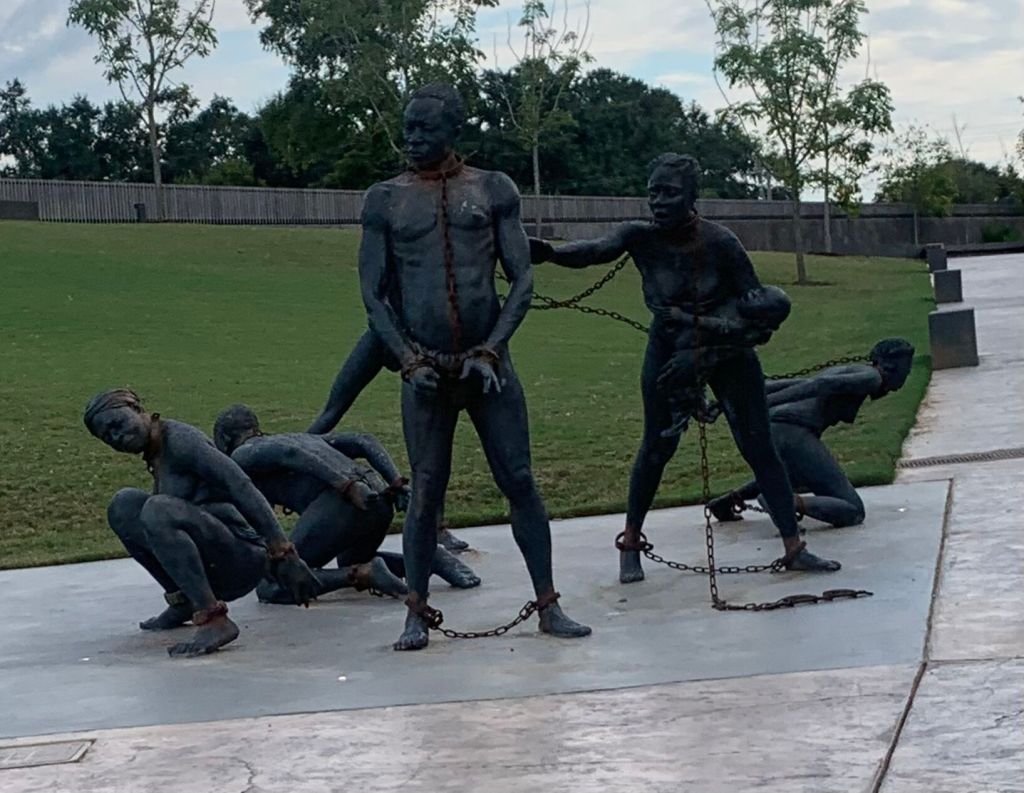Slavery reparation measures gain traction
Published 6:00 am Wednesday, December 22, 2021

- A display at National Museum for Peace and Justice in Montgomery, Ala. demonstrates enslaved persons. Photo by Asia Ashley
ATLANTA – Civil rights leaders and a select group of lawmakers have pushed for slavery reparations for years, but for the first time in three decades, there appears to be some traction.
The effort surfaced 30 years ago in Congress but went several steps further in April when the Democrat-led House Judiciary Subcommittee on Constitution, Civil Rights and Civil Liberties committee advanced HR 40.
The bill would create a committee to study and develop reparation proposals for African Americans as a result of slavery and its lingering effects on Black people.
Co-sponsored by 195 House Democrats, Republicans on the committee voted against moving it forward.
“With that much support in the House of Representatives, I think the time is now this session of Congress to bring forward HR 40 to the House floor for a vote,” said Georgia Democratic Rep. Hank Johnson, who serves on the House Judiciary Committee and co-sponsored the bill. “It’s already been passed out of committee out of the Judiciary Committee. That’s the first time that that has happened. So the bill has a lot of momentum and I’m optimistic that it will be brought to the floor for a vote and if so it will pass.”
The bill now awaits introduction on the House floor and approval in both Chambers. If approved, after conducting research, the committee would be tasked with recommending appropriate remedies that address:
– How its recommendations comport with international standards of remedy for wrongs and injuries caused by the State, that include full reparations and special measures.
– How the U.S. government will offer a formal apology on behalf of the people of the United States.
– How federal laws and policies that continue to disproportionately and negatively affect African Americans as a group, and those that perpetuate the lingering effects, can be eliminated.
– How the injuries can be reversed and provide appropriate policies, programs, projects and recommendations.
– How any form of compensation to the descendants of enslaved African is calculated.
– What form of compensation should be awarded, through what instrumentalities and who should be eligible for such compensation.
Slave owners were largely common in the South, which saw home to the majority of the country’s enslaved population. According to worldatlas.com, there were five states with more than 400,000 slaves just before the beginning of the Civil War including Virginia 490,867, Georgia, 462,198, Mississippi, 436,631, Alabama, 435,080, and South Carolina, 402,406. Other states include Louisiana, 331,726, North Carolina, 331,059, and Tennessee, 275,719, according to worldatlas.com.
“Many of my friends who have bought into the Big Lie and who also don’t want our children to learn about the history of slavery in this country are concerned about what they think reparation is, and they believe it is giving everybody a handout,” said Johnson, who serves on the House Judiciary Committee and co-sponsored the bill. “But no, it is looking at addressing systemic inequality that exists in health care, in housing, in education, in employment, these kinds of things, and how do you address the reality of inequity for Black people in those areas.”
The slavery reparations measure was initially introduced by the late Michigan Rep. John Conyers in 1989, and he introduced it every session until his death in 2019.
The National African American Reparations Commission — a nonprofit formed in 2015 to fight for reparatory justice, compensation and restoration of African American communities from slavery — compiled a recommended reparations guide for people of African descent in the U.S.
Its 10-point reparations recommendations include setting aside tracts of government land in the South and other regions to be used for educational, commercial, industrial, economic/business and health/wellness institutions and enterprises to African Americans; funds for the establishment of a Black Business Development Bank to provide grants and loans to socially responsible for-profit entrepreneurship/economic ventures, dedicated to building the Black community, utilizing more just labor policies and sustainable environmental practices and the government issuing a formal apology.
The commission also recommended providing African Americans with sufficient monetary resources to relocate back to Africa, if they choose.
Alabama and Tennessee are among nearly 10 states that have issued an apology for their involvement of enslaved persons in America through legislation in 2007.
Alabama’s apology, signed in 2007 by then-Republican Gov. Bill Riley stated that slavery was “a wrong committed upon millions of Black Americans and that their ancestors are the beneficiaries of such wrongs, including, but not limited to, segregation under Jim Crow, housing discrimination, discrimination in education and other ills inflicted upon Black people,” and the legislature expressed “deepest sympathies and solemn regrets to those who were enslaved and the descendants of slaves, who were deprived of life, human dignity and the constitutional protections accorded all citizens of the United States.”
In January, six Democrat Georgia representatives sponsored a bill in support of the creation of a federal reparations study committee. The bill was not voted out of either of the state’s chambers; there does not appear to be any proposed legislation for slavery reparations in Mississippi, which has the largest percentage of Black population in the country.





